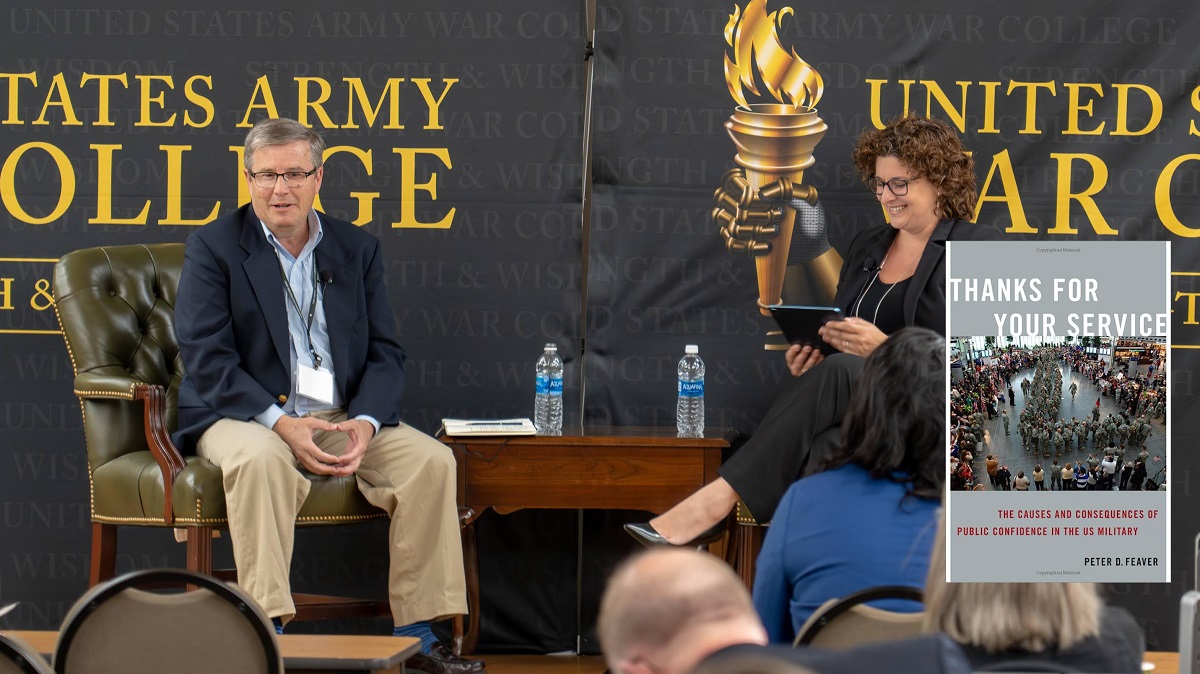
The U.S. Army War College Civil-Military Relations Center hosted its inaugural conference in May 2023. This year’s theme on the military and society was the American all-volunteer force as it turns 50. One of the major sub-themes throughout was the recruiting crisis and what it portends for the all-volunteer force. What affects people’s willingness to join the military? What policies may be most effective in sustaining the all-volunteer force? How does the relationship between a military and its society impact national security? On Saturday, May 6, the keynote speaker was one of the most prominent scholars of civil-military relations, Peter Feaver. He was joined by moderator and chair of the Department of National Security and Strategy, Carrie Lee, to discuss the state of public trust in the military and his new book, Thanks for Your Service: The Causes and Consequences of Public Confidence in the Military. We were able to capture their conversation and are pleased to present it to you as a bonus episode on A Better Peace: The War Room Podcast.
The military needs to be focused on deservedness…They are right to worry about public confidence in the military. They should want that number to be high. But they should want it to be high for deserved reasons: because they’re competent, because they’re professionally ethical, because they stay outside of politics…That’s deservedness that is worth earning. So earn the public’s respect.
Podcast: Download
Subscribe: Android | Email | RSS
Peter D. Feaver is a Professor of Political Science and Public Policy at Duke University. He is Director of the Duke Program in American Grand Strategy and co-PI of the America in the World Consortium. Dr. Feaver is author of the forthcoming book Thanks for Your Service: The Causes and Consequences of Public Confidence in the Military; Armed Servants: Agency, Oversight, and Civil-Military Relations; and Guarding the Guardians: Civilian Control of Nuclear Weapons in the United States. He has published numerous other monographs, scholarly articles, book chapters, and policy pieces on grand strategy, American foreign policy, public opinion, nuclear proliferation, civil-military relations, and cybersecurity. Dr. Feaver served on the National Security Council staff in both the Clinton (as a Director for Defense Policy and Arms Control, 1993-1994) and Bush (as Special Advisor for Strategic Planning and Institutional Reform, 2005-2007) administrations. He received his Ph.D. from Harvard University in 1990.
Carrie A. Lee is an associate professor at the U.S. Army War College, where she serves as the chair of the Department of National Security and Strategy and co-director of the USAWC Center on Civil-Military Relations. She received her Ph.D. in political science from Stanford University and a B.S. from MIT.
The views expressed in this presentation are those of the speakers and do not necessarily reflect those of the U.S. Army War College, U.S. Army, or Department of Defense.
Photo Description: Peter Feaver (L) and Carrie Lee (R) at the Civil-Military Relations Center’s inaugural conference, May 6, 2023.
Photo Credit: Dr. Ron Gurantz





“because they’re competent, because they’re professionally ethical, because they stay outside of politics…”
Competent- In what way have our senior leaders proven that they are competent given their complete lack of capability and accountability in the last two conflicts?
Professionally Ethical- What is ethical about the conduct of many of our highest ranking officers actions and lack of accountability in the two conflicts?
Outside of Politics- The continued politicalization of the officer corps is becoming so disturbing that when it is compounded by their perceived incompetence and lack of ethical accountability that it would seem almost impossible to have trust in this institution. I can assure you that the average enlisted person with more than a few years of service no longer has much trust in the institution.